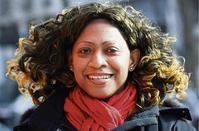Barbara Nelson, Contributor

- Contributed photos
The Fulbright Programme, a grant for international educational exchange for scholars, educators, graduate students and professionals, is considered to be among the most prestigious award programmes. It operates in 144 countries and promotes peace and understanding through educational exchange.
Recently, Jamaican-born Jacqueline Bishop, who has been at New York University (NYU) for some 12 years, first as a student and later as a teacher, was awarded a Fulbright Scholarship.
Jacqueline is the founding editor of Calabash: A Journal of Caribbean Arts and Letters. She has been published in The Caribbean Writer, Crab Orchard Review, Macomere, Renaissance Noire and Wasafiri, among other journals.
Olive Senior, renowned Jamaican author and short story writer, described Bishop's first novel, The River's Song, as "warm, strong and bittersweet".
I asked Jacqueline if she enjoyed writing the book. She replied:
"I don't know if writing a novel is ever an enjoyable thing; I think it is more of a necessary thing. I think characters have a story to tell (my characters are real people for me, existing somewhere out there in a real world) and they go in search of an author to tell their story. I think your characters choose you to tell their story; not the other way around. Naturally, I cannot speak for everyone; I only know this to be true for myself.
"So," she continued, "these characters come, they set up shop, and they refuse to go. They are happy when you get them right, and they will not let you sleep at night when you get them wrong. That was how it was with The River's Song. In some ways the characters in that book made my life."
careful about Caribbean culture
She feels that she was very fortunate in having the book edited by Jeremy Poynting and published by Peepal Tree Press, because "they are more knowing of, and careful about Caribbean culture and the island of Jamaica, than the average European or North American publisher.
"The book, when I finally held it in my hand, was everything I had hoped it would be," she said.
Jacqueline was born in Kingston, but spent much of her holidays in the small district of Nonsuch in Portland. Shortly after completing Holy Childhood High School in St Andrew, she migrated to the United States to be with her mother.
She attended Lehman College, City University of New York, where she obtained a bachelor's degree in psychology. As a junior at Lehman College, she spent a summer studying French in Montreal, Canada, at Concordia University; and a year living in Paris, France and attending L'Universite de Paris.
It was while she was in France that she began thinking about becoming a writer. I reminded her of this and asked how she feels the experience of going to Morocco on the Fulbright Scholarship will influence her.
"What I am hoping for, more than anything else from my experience in Morocco, is another identity in addition to that of being a writer. There is a large world around us, and increasingly I find myself interested in and drawn to international relations," she replied.
creative writers
"In looking at some of the people I most admire as creative writers, I have been heartened by how many of them live other lives alongside that of being a writer. The great Pablo Neruda, (of Chile) for example, was a diplomat; and Aime Cesair, (of Martinique) who we just, sadly, lost, headed his own political party. I would like to live a life like that. A life in which I have other things that I am doing, in addition to being a writer. I hate the ivory tower approach to writing. I hate how creative writing, particularly poetry writing, has been largely segregated and divorced from the body politic.
"I would love to see poetry and creative writing take their rightful place both inside and outside of academia, and this is why I think it is important that creative writers and artists of all stripes have lives both inside and outside of academia. Consequently, I am really looking forward to spending a year in Morocco, outside of academia."
In 1996 Jacqueline obtained a James Michener Creative Writing Fellowship to the Caribbean Writers Summer Institute (CWSI) at the University of Miami, where she studied poetry with Lorna Goodison.
That was a tremendous experience for her.
"I am so sorry that CWSI no longer exists!" she said. "The year I went, Lorna Goodison, George Lamming and Earl McKenzie were all there. And there were all these writers from all over the Caribbean, from Puerto Rico, the Dominican Republic, Jamaica, St Maarten, Haiti, all over!
"And then," she continued, "There was Lorna! If there is one word that I would use to describe Lorna, and Lorna's work as a writer, it is generosity. Lorna is an incredibly generous person!"
An iconic moment occurred for Jacqueline at one of the spontaneous readings that would take place in some person's room.
She explained, "At one of these readings, the lights turned off for dramatic effect, and listening as people read by candlelight, hearing the multitude of voices and the various accents, I started wondering, who is going to publish all these wonderfully talented people?"
fiction writing
Calabash: A Journal of Caribbean Arts and Letters, a journal she founded at NYU, was conceived in that room at that moment.
While at the Caribbean Writers Summer Institute at the University of Miami in 1996, Trinidadian-born novelist, playwright and short story writer, Earl Lovelace, looked at and gave her feedback on her fiction writing, and both Sandra Pouchet Paquet (the director of the institute) and Barbadian author, George Lamming, gave her suggestions on the oral histories of Jamaican women in New York that she was then collecting. That work would later be published as My Mother Who Is Me: Life Stories from Jamaican Women in New York.
"That experience at CWSI was central, informative, definitive, of some of the things that I would later go on to do; and to some of the friendships and relationships that are so dear to me now," she said.
As a graduate student, Jacqueline started making a film on Jamaican intuitives in which she is looking to bring to the forefront a group of artists whose work is seldom seen outside of Jamaica. The objective of the film is to trace the historical development of this untutored 'group'; as well as to analyse and engage the themes of their work.
The film also has as a primary objective, a positive portrayal of Jamaica, via the intuitives, thereby lessening over-representations of the challenges of Jamaican society.
ultimate goal
"To date I have interviewed several individuals, among them the Rastafarian-inspired painter Leonard Daley; the internationally recognised master painter/sculptor, the late Everald Brown; as well as the female intuitives, Evadney Cruikshank and Delores Anglin. I have also interviewed Dr David Boxer, curator of the National Gallery of Jamaica; noted art critics Veerle Poupeye and Dr Petrine Archer-Straw; gallery owner Annabella Proudlock; and several other artists, some no longer living."
The ultimate goal is to edit these interviews, archival and other film footage into a powerful hour-long documentary that tells the story of this vibrant and dynamic group of artists as integral to the story of modern Jamaica and modern Jamaican art.
All of this, however, can only be accomplished by financing.
"I need financing to come back to Jamaica and interview a couple of the artists and other individuals I missed the last time around," Jacqueline said. "And I need financing, especially, to complete post-production work on the film."

